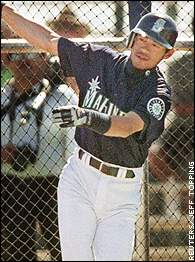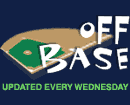Masanori Murakami was the first Japanese player to risk the twin perils of jetlag and American strike zones, going 5-1 with nine saves for the 1964-65 Giants while pitching on the same staff as Juan Marichal and Gaylord Perry.
Three decades passed before Hideo Nomo followed in Murakami's path, lighting up ballparks in 1995 the way Kurosawa lights up movie screens. Nomomania not only filled Dodger Stadium to overflowing crowds, it opened the doors to a wave of Japanese imports who hadn't been born when Murakami made his major-league debut: Shigetoshi Hasegawa, Mac Suzuki, Hideki Irabu and most recently, Kazuhiro Sasaki, the world's oldest living rookie of the year.
|  | | If Ichiro Suzuki agrees to terms with the Mariners, he will become the first Japanese position player to ever play in the U.S. major leagues. |
And now a new player and a new era of Japanese baseball await at the ballpark steps in the form of Ichiro Suzuki. For while we're as accustomed to Japanese pitchers baffling American hitters as we are Japanese VCR directions baffling American families, a Japanese position player has yet to so much as spit a sunflower seed or scratch his privates in a major-league game.
Suzuki would like to become the first.
He is the best player in Japan, a career .353 hitter so good and so consistent that he makes Tony Gwynn look like Tony Eusebio. He's won his league's batting title every full season he's played, seven in a row in all. That's more than Wade Boggs ever won here, and Suzuki is just 27.
After hitting .387 for the Orix Blue Wave last year Suzuki decided enough was enough -- he wanted to play in the major leagues. Realizing that Suzuki would leave the team in 2002 when he becomes a free agent anyway, Orix put his negotiating rights up for bid to major-league teams. It was a Japanese version of last winter's Ken Griffey Jr. saga, minus the threats to be traded to be near his family in that well-known Nagoya suburb, Cincinnati.
Seattle won the bid, paying $13 million last week just for the right to negotiate a contract with Suzuki (Scott Boras is already investigating how he can wrangle the same sort of arrangement for Alex Rodriguez). The Mariners and Suzuki have until Dec. 10 to work out a contract; if they don't, Orix returns the $13 million and Suzuki returns to Japan for another season.
The two sides have lowered the Cone of Silence on negotiations, with Suzuki reportedly looking for at least four years at $7.4 million per. The Mariners may not go that high, but expect a deal because both Seattle and Suzuki want this to work. The Mariners, owned by the Japanese Nintendo corporation, need a left-handed hitting outfielder and were thrilled by Sasaki's performance last season. Suzuki has nothing left to prove in Japan, wants to play in the majors, wants to play with Sasaki and in a wonderfully welcome turn of events for Seattle fans, actually wants to play with the Mariners (with whom he trained briefly during the spring of 1999).
After that, it's just a measure of seeing whether Suzuki can hit big-league pitchers and whether major-league press boxes are big enough to hold all the extra Japanese reporters. There will so many assigned 24-7 to the Suzuki-beat that Godzilla could rise from Toyko harbor again to play Charles Barkley and there wouldn't be anyone left to cover it.
Neither the Japanese reporters nor the major-league fans will be disappointed. Sure, no Japanese hitter has played here before, but Suzuki is the perfect candidate. What he lacks in power he makes up for in speed and patience.
"He's one of the best pure hitters I've ever seen," said Brian Raabe, who played briefly in the majors before playing the 1998 season in Japan. "If the Mariners can get ahold of him, he'll be a great find. They have a lot of off-speed pitchers over in Japan and he'll hit the best off-speed pitch you can throw him. And we had some guys who threw legitimately in the 90s and he had no problem turning on their fastballs. Give him time to adjust and teams are going to have a very hard time getting him out."
Suzuki may need some time learning big-league strike zones and pitching styles, but he's going to hit. Win seven batting titles anywhere and you'll be able to hit in the majors.
What's Japanese for "Hit 'em where they ain't?"
Jim Caple is the national baseball writer for the Seattle Post-Intelligencer, which has a Web site at www.seattlep-i.com. | |
ALSO SEE
Initial negotiations between Suzuki, Mariners go well
AUDIO/VIDEO
 Peter Gammons explains the Ichiro Suzuki situation. Peter Gammons explains the Ichiro Suzuki situation.
wav: 1231 k
RealAudio: 14.4 | 28.8 | 56.6
|

 Peter Gammons explains the Ichiro Suzuki situation.
Peter Gammons explains the Ichiro Suzuki situation.
